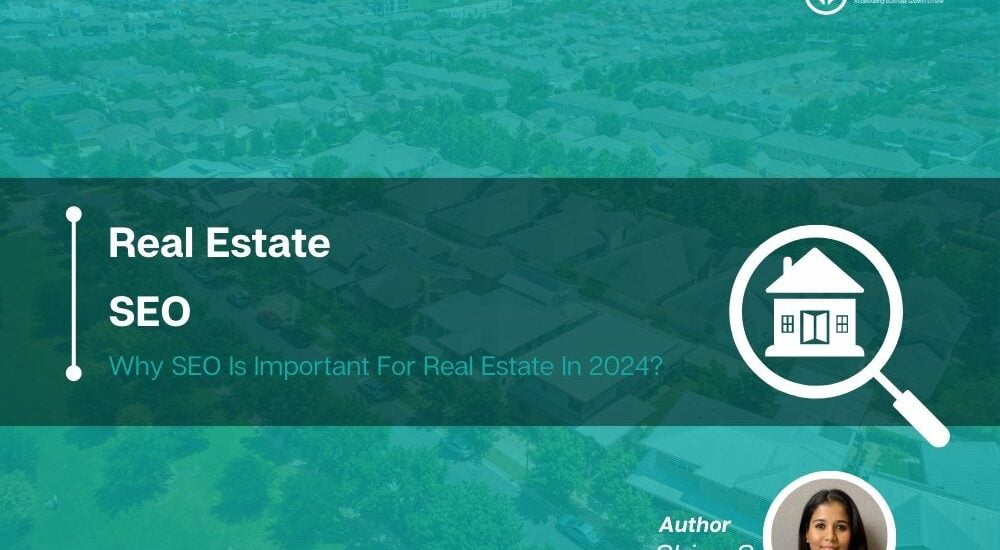Real Estate SEO
Why SEO Is Important For Real Estate In 2024?

A Good online presence is essential for any business success. The real estate business is never out of this scale. Search Engine Optimization has a high role in driving traffic by converting visitors into clients crucial for real estate websites. Below, we can Explore the advanced SEO tactics tailored for real estate professionals and guide keyword research to achieve meaningful conversions.
Understanding the Importance of SEO in Real Estate
SEO is optimizing a website to rank higher in search engine results pages (SERPs) for suitable queries. Effective SEO can mean the differences between being found by potential clients or getting lost among competitors. Below is how SEO matters in real estate:
- Ranking tall in search results creates more visibility for clients searching for properties or real estate services.
- SEO attracts organic traffic into more qualified leads actively looking to buy or sell property.
- Higher rankings build trust and credibility among users, positioning real estate professionals as industry experts.
How People Searching Their Property In 2024?
Online Presence has become crucial for real estate as 99% of home buyers use the internet for the home buying process age, ranging from 24 to 57, and the elderly generation, 84% ages, ranging from 77 to 97 in 2022.
By NAR, 86% of members have their listings on the website, 70% have information about buying and selling, and 66% have a link to their business website. 20% of all members get 1-5% of their business from social media, and 11% get 6-10% in 2023. (Source)
The residential market also hit new peaks with record-breaking quarterly sales. Q2 2023 saw above 64,500 units sold, marking a 4% quarter-on-quarter growth.
2023-24 is a boom year for the property market in India, with a compound annual growth rate of 9.2% expected between 2023 and 2028.
Uncompromisable benefit from SEO:
A benefit of SEO for real estate is the improved online visibility that is crucial for attracting potential clients in a highly competitive market.
Below are some key benefits of real estate SEO:
- Increased visibility: By ranking higher in search results, real estate websites attract more organic traffic without depending on paid advertising.
- Bring Targeted Buyers: SEO helps to target specific audiences looking for real estate services, leading to more qualified leads and potential sales.
- Local Visibility: For real estate, local SEO ensures that the properties and services offered are visible to specific locations.
- Long-Term Growth: Paid campaigns stop when funding ends, and SEO efforts contribute to sustained long-term growth and brand recognition.
- Brand Credibility and Trust: High search engine rankings equate to greater credibility and trust of potential clients. People trust websites that appear at the top of search results and positively impact the real estate business.
- Cost-Effective Marketing: SEO is one of the most cost-effective marketing strategies that provides a better ROI than other forms of advertising.
The ability of SEO to increase a real estate firm’s organic visibility and attract more targeted traffic is an uncompromisable benefit.
Types Of SEO for Real Estate SEO:
Website SEO:
SEO for real estate websites is a crucial aspect of marketing for real estate professionals to increase their online visibility and attract potential clients. Some key points to consider for optimizing your real estate website:
- Organize and present information on the website for search engines to understand and focus on keywords searched by home buyers.
- Effective SEO strategies attract more buyers and listings by increasing brand awareness and reducing dependency on paid channels.
- Include on-page optimization (URLs, title tags, and images), off-page tactics (link building and social media marketing), technical SEO (improving site load speed and mobile-friendliness), and local SEO (creating relevant content).
- Develop compelling content that showcases expertise and engages with the target audience to boost the rankings and credibility.
SEO is a consistent, ongoing effort that requires a long-term commitment but offers high ROI over time.
Google My Business Profile:
Google My Business is a free tool by Google for businesses to manage their online visibility across various Google services, including Google Search and Google Maps.
A Google My Business Profile is an excellent way to enhance the real estate business online presence to appear in local search results and on Google Maps, making it easier for potential clients to find and contact you.
- Go to the Google My Business Profile website and claim your business or manage an existing profile.
- Personalize details like hours, photos, and other information to help customers discover your business.
- Use GMP to share updates, respond to reviews, and connect with customers directly on Google.
The Google My Business profile can generate high-quality leads for real estate Business owners. Regularly update the profile with the latest information and actively manage the online reputation through customer interactions.
Video SEO:
Video SEO in real estate is becoming increasingly essential for Business owners. Below are some key findings from the latest reports:
- High Engagement: Real estate videos are highly engaging and can significantly increase potential buyers to spend more time looking at a property listing. Profile of Home Buyers and Sellers says that 51% of buyers found the home through the internet.
- Better Lead Generation: Listings with video content generate more leads. 39 % of users used Embedding videos for their home search, and 56 % of them felt useful. It can also boost the organic search results of the pages they’re on.
- Increased Conversion: Videos can be the deciding factor for buyers in the middle or bottom of the sales funnel. Real estate mogul Barbara Corcoran initially recorded videotapes of her listings but had the highest success when she uploaded the videos on her website.
- Local SEO: With searching for properties high locally, optimizing video content for local search is crucial, including using location-specific keywords and business details in the video description.
- Preference Among Homeowners: 73% of homeowners prefer to list with realtors who use video marketing, yet only 10% of agents took advantage of this strategy by listing videos.
Why You Should Implement SEO Strategy As A Real Estate Business Owner?
Implementing an SEO strategy as a real estate business owner is essential for several compelling reasons:
- Starting a real estate journey online and having a high online presence is crucial in the technological world.
- Implementing SEO tactics helps the website and listings rank higher in search engine results pages (SERPs), making it easier for clients to find you when they search for relevant keywords or phrases.
- SEO allows you to target specific keywords and phrases relevant to your real estate business and target audience.
- By optimizing your website and content for keywords, you can attract highly targeted traffic from potential home buyers or sellers who are actively searching for properties or real estate services.
- Ranking well in search results through SEO efforts can build credibility and trust with potential clients, leading to increased inquiries, leads, and conversions.
- Compared to traditional marketing methods like print ads or direct mail, SEO is a cost-effective way to market your real estate business.
- A strong SEO strategy can give a competitive edge over other agents or agencies.
- Outranking competitors in search results can capture more leads and opportunities by growing your business and market share.
- Consumer behavior and preferences constantly evolve in the digital age. Stay ahead of trends and adapt SEO strategy to ensure your real estate business remains relevant and visible to potential clients.
Unlike other forms of marketing that deliver short-term results, SEO offers long-term sustainability for real estate businesses.
How To Get Started?
Create an Interactive website:
Creating an interactive website can enhance user engagement and provide a more immersive experience for visitors. The website Should Have a Proper portfolio of the company, vision, mission, and its founder and team.
How to create an interactive website:
- Determine the purpose and goals of the interactive website.
- What is the Aim? To showcase products, provide information, collect leads, or entertain users. It guides the design and development process.
- Select a website-building platform that supports interactive features and meets your needs.
- Popular options are WordPress (with plugins like Elementor or Divi), Wix, Squarespace, or custom development using HTML, CSS, and JavaScript.
- Create a sitemap to outline the structure of your website. Identify the main pages, categories, and subpages to include.
- Design an attractive and user-friendly layout for the website. Use color schemes, typography, and imagery that reflect the brand identity and appeal to your target audience.
- Add interactive features and elements like Sliders and carousels, Video backgrounds, Quizzes, surveys, polls, Animated effects or hover effects, Interactive forms, maps or videos, Chatbots or live chat.
- Ensure the website is optimized for mobile devices to provide a seamless experience across all screen sizes.
- Test your website to identify bugs, usability issues, or compatibility issues.
- Implement search engine optimization (SEO) best practices to improve the visibility of search engine results.
- Optimize page titles, meta descriptions, headings, and image alt tags with relevant keywords.
- Create high-quality, engaging content to attract organic traffic and encourage social sharing.
- Once your interactive website is ready, launch it and promote it to your target audience on social media, email newsletters, and other marketing channels to drive traffic and increase awareness.
- Regularly maintain and update the website to keep it fresh, relevant, and functional.
- Update content, add new features, and fix issues to ensure a positive user experience.
Importance of Property Page:
For a real estate website, the property page is one of the critical sections to showcase the details of individual properties to attract potential buyers or renters. The property page typically includes:
Property Photos and Videos:
High-quality images and videos and a gallery of professional photos to highlight the interior and exterior of the property and any unique selling points.
Property Description:
Suggest a detailed description, including its features, amenities, and specifications. Highlight key selling points like the number of bedrooms and bathrooms, square footage, layout, architectural style, and recent renovations or upgrades.
Location Information:
Include information about the location, neighborhood, and nearby amenities. Highlight attractions like schools, parks, shopping centers, restaurants, public transportation options, and nearness to highways or landmarks.
Price and Availability:
Display the price of the property and additional costs like homeowners association (HOA) fees or property taxes. Indicate the availability status and provide contact information for inquiries or scheduling viewings.
Property Features and Amenities:
Create a list of features and amenities to give potential buyers or renters a comprehensive overview. Include details like flooring types, kitchen appliances, heating and cooling systems, outdoor spaces, parking options, and amenities like a swimming pool or fireplace.
Contact Information and Call-to-Action:
Make it easy for users to contact you or schedule a viewing of the property by including contact information and a clear call-to-action (CTA) button. Provide multiple contact options like phone number, email address, and a contact form.
Customer Reviews or Testimonials:
Include customer reviews or testimonials from previous buyers or renters. Positive reviews can build trust and credibility with potential clients.
Measuring SEO Success in Real Estate
- Monitor keyword rankings to assess the impact of SEO efforts.
- Track increases in organic traffic from search engines for high-intent keywords.
- Measure the number of leads generated through organic search and analyze conversion rates.
- Calculate the return on investment (ROI) of SEO efforts by comparing the cost of implementation with the value of acquired leads and closed transactions.
- Produce High-Quality content that caters to your local market and includes neighborhood guides, market trends, local events, and school district information to improve chances of ranking for local searches.
- Target long-tail keywords that reflect specific property types, locations, or buyer/seller intents to have less competition and higher conversion rates.
- Implement schema markup to provide search engines with details like property type, price, address, and more, leading to rich snippets in search results.
- Prefer user experience by ensuring easy to navigate, loads quickly, and provides valuable information website to visitors.






